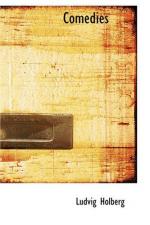Jeppe. What have I done now?
First man. You’ll see when justice takes its course.
SCENE 6
(Enter the Judge, followed by two Lawyers. He sits down. Jeppe, his hands tied behind him, is brought to the bar. One of his captors steps forward.)
First man. Here is a man, your honor, whom we can swear to have seen sneaking into the baron’s house, where he posed as his lordship, put on his clothes, and tyrannized over the servants. As this is a piece of unheard-of impudence, we demand on behalf of his lordship that it be punished with such severity that it shall serve as an example and a warning to other evil-doers.
Judge. Is this accusation true? Speak out whatever you may have to say in answer to it, for we do not wish to convict any one unheard.
Jeppe. Alas, what a God-forsaken man I am! What can I say? I admit I deserve punishment, but only for the money I squandered on drink instead of buying soap with it. I also admit that I have recently been in the castle, but how I got there and how I got out again, I haven’t the least idea.
First lawyer. Your honor has it on his own admission: he got drunk and in his drunkenness committed this unheard-of outrage. All that remains is to decide whether the guilt of such a gross misdeed can be held devoid of criminal intent because of intoxication. I argue that it cannot, for if it could, neither fornication nor murder could be punished, for every criminal could seek that escape and assert that he had committed his crime while intoxicated. And although he can prove that he was drunk, his case is none the stronger, for the law is: What a man does under the influence of drink he shall answer for when sober. It is well known that in a recent case of the same nature the misdeed was punished, although the criminal was led into passing himself off as a lord through his own simplicity; his ignorance and foolishness could not save him from death. The penalty is imposed purely as a warning to others. I would tell the circumstances, were it not that I fear to delay justice thereby.
Second lawyer. Your honor! This story appears so remarkable to me that I cannot accept it without the testimony of several witnesses. How could a simple peasant get into his lord’s house and impersonate his lordship unless he could imitate his very form and features? How could he get into the lord’s bedroom, how could he put on his clothes, without any one being aware of it? No, your honor, one can plainly see that this is the outcome of a conspiracy on the part of this poor man’s enemies. I hope, therefore, that he may be discharged.
Jeppe [weeping]. God bless your mouth. I have a bit of tobacco in my breeches pocket which perhaps you won’t refuse; it’s good enough for any honorable man to chew.




